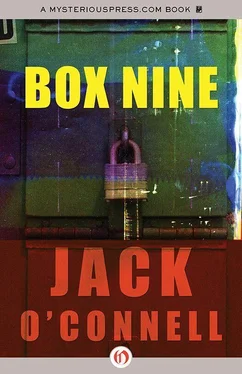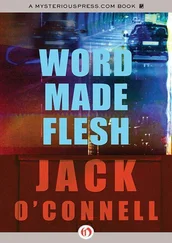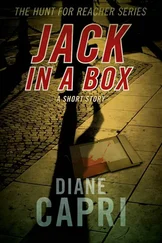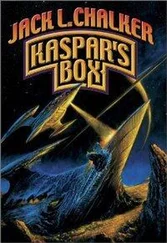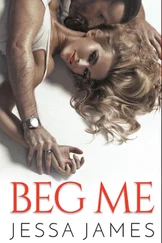He looks to be in an uncomfortable position, neither sitting nor lying down, but an unusual blend of the two. His head is cocked backward on the back edge of the couch, his face pointed up to the tin-plated ceiling. His mouth is open slightly. His hands are gripping a book spread open in his lap. Cortez would like to read the title without waking the man.
Instead, he takes a step to an elaborate walnut bookcase with a sign resting on top that reads “New Arrivals.” He starts to reach out to pull down Harry Keeler’s The Book with the Orange Leaves , but stops himself and simply looks. He feels uneasy, like the confused kin of a young mother who’s given her infant up for adoption, and now returns to his school yard to simply stare at what was once hers. He turns away from the bookcase, annoyed with himself for the dramatics, ashamed of the conceit of this idea. But he can’t help one last thought— I’m not much more than the fictions I’ve sold.
The entrance bell did nothing to disturb the sleeping man and Cortez is unsure whether to ignore him and begin browsing or to try to wake him gently and announce his presence. Then the thought hits him that it’s possible the man is dead, a heart attack in the middle of the book’s climax, maybe a murder scene or a chase.
Cortez leans forward slightly without taking a step. He wants a sign of breathing. The chest to rise. The eyes to flutter.
But there’s nothing. He has to confirm the worst. He begins to move toward the couch and the man’s mouth opens and says, “You’re a first-timer.”
Cortez stops and instinctively squelches any show of surprise. The man hasn’t moved his head or opened his eyes. Cortez finds this rude. Especially to a potential customer. The guy obviously has no business skill. It’s amazing the place has stayed in operation so long.
“Excuse me?”
Now the head comes up and the body straightens itself into a normal sitting posture.
“Ephraim Beck,” he says, extending a hand that Cortez walks toward and shakes. “I doze sometimes. When it’s slow. I find it very refreshing.”
“I’m sure.”
“What I said was, this is your first visit to the store. Most of the customers here are regulars. That’s the way it is with specialty stores, you know.”
“I can imagine.”
“You from out of town?”
“Here on business.”
“Saw the ad in the yellow pages?”
“Actually, I asked the desk clerk at the hotel for some of the better bookstores in the city.”
“I see. Are you a collector?”
“Really, a beginner. An amateur.”
“We’ve got something for everyone. Any author you’re especially interested in? You look like you might be a Chesterton man. Am I right?”
“To be honest, I’m going to be doing a great deal of traveling in the near future. A lot of time on planes. Trains. I’m looking for some tides that will keep my interest. But at the same time I don’t want to load myself down.”
The man squints his eyes a little and makes a noise, sucking air through his clenched teeth. His manner suggests he’s weighing a difficult decision. Finally, he shrugs and says, “I think you’re going to want to go with paperbacks.”
“Paperbacks,” Cortez repeats.
The man nods. “I know, I know. It’s like you can feel the decay in your hands as you’re reading the first line. But you’ve got limited luggage capacity, correct? And if you’re going to be on the road for any length of time … Let’s just say you stuff a first-edition Chesterton down into the Samsonite before you turn it over to the airline people. Come the end of your trip, I don’t want to look. I mean, it’s a question of respect.”
Cortez decides this is the kind of man who could wander off into endless oblique stories with no apparent meaning. He says, “Do you have any Hammett?”
The man takes a breath and smiles indulgently, as if to say, please, think about your questions before you ask them.
“Okay, how about the obvious choice?”
“That’s not so obvious to me.”
Cortez nods. “Sorry. Maltese Falcon. Any paperback edition.”
“I’ve got one by Vintage. Two ninety-five, plus tax. Good-sized print.”
“Sold.”
Mr. Beck smiles and starts to move for a wall of paperbacks toward the rear of the store. He throws his voice back over his shoulder as Cortez follows. “Now we’re moving. What else can we get? You said it would be a long trip.”
“Yes, but now that I think about it, that one tide should do it. There’ll be some books waiting for me at my first stop.”
The clerk stops at a shelf, runs a finger parallel to the books’ spines without touching them, stops, and pulls down a black-covered book with green lettering and a picture of the famous bird sitting like an Egyptian sphinx.
He turns back toward Cortez and presents it. “First published in ’30. Still tremendously popular today.”
“I’ve read it before.”
“I would think so,” the man says, and then seems to regret it.
Cortez lets him off the hook and says, “There’s a part of this book that gets to me. One particular scene. A small bit. You know what I’m talking about?”
The man smiles as if they’d just become conspirators. As if they’d sealed some kind of mutually beneficial agreement.
“You know the scene? With Spade and Bridget O’Shaughnessy? At Spade’s place?”
“The story of Flitcraft,” the man says.
“Exactly,” Cortez says. “I knew you’d know.”
The man’s head slopes to the side a little. His lips stay together.
“I’ve always wondered what other people thought about that.”
When the man realizes that Cortez is waiting for a response, he says simply, “Of course.”
“Why do you think that scene is in there?”
The man lets his head roll slightly. His tongue slides out of his mouth and wets his lips. “It’s a great story,” he says.
They stare at each other for a few seconds, then Cortez reaches into his pocket and pulls out a roll of bills. Without looking, he fans them slightly, lets his fingers run through the fan, in decreasing denomination, until he stops and yanks loose a five. He hands it to Beck and says, “Keep the change.”
Ike has left the clock radio on and now, as he sleeps, the talk-show host warns the public about the dangerous epidemic of skinheads, racist teenage males who shave their scalps and engage in hideous violence in our urban cesspools. These skinheads, according to the talk-show host, are one of the greatest dangers facing our society today, a horrible blight on the landscape of freedom and truth, a perversion of all the values that America has fought and died for in bloody wars on foreign shores. They are monsters, beasts, scum of the earth, and must be dealt with as such.
HOST: Thank you for waiting, you’re on WQSG, tell the city what’s on your mind.
CALLER: Ray? Hello? Ray?
HOST: Yes, ma’am, you’re on the air.
CALLER: Hello? I don’t … Hello?
HOST: Go ahead, dear, we don’t have all night. You’re on the air.
CALLER: Oh yes, thank you, love the show, listen all the time.
HOST: Thank you. Your question, please.
CALLER: Yes, well, I was wondering, this skinhead problem, this problem you’ve been discussing, I was wondering, is this an inherited problem, what you would call a genetic problem, because my husband’s brother — oh, I was going to say his name, but never mind, he has no hair, he lost all his hair, all at once, just gone, not even any left around the ears, like, you see. Now, they called that, the doctor he went to called that alopecia, and his hair never came back, but he was always the same man we’ve known, wonderful man, nothing like these people you’ve described, he had none of these side effects …
Читать дальше
